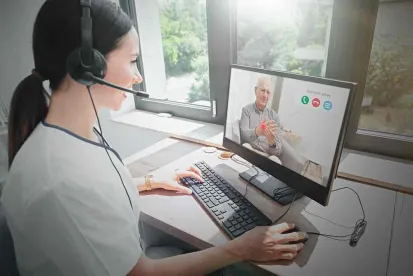On July 23, 2021, the Center for Medicare & Medicaid Services (“CMS”) released the CY 2022 Physician Fee Schedule Proposed Rule (“Proposed Rule”) which outlines several proposed changes to reimbursement of Medicare telehealth services.
As a result of the COVID-19 Public Health Emergency (“PHE”), CMS instituted several waivers and flexibilities to allow increased access to care via telehealth. Prior to the PHE, approximately 15,000 fee-for-service Medicare beneficiaries received telehealth services each week. By contrast, in the last week of April 2020 approximately 1.7 million Medicare beneficiaries received telehealth services. Preliminary data shows that between March and October of 2020, 24.5 million out of 63 million Medicare beneficiaries received Medicare telehealth services.1
Telehealth Services List
The uptick in the use of telehealth was due in part to an expanded Medicare telehealth services list. In response to the PHE, CMS added over 100 additional services to the Medicare telehealth services list on an interim basis. Over the past year and a half, CMS has received substantial requests to make permanent many of the telehealth services that were added during this time. As discussed in the Proposed Rule, CMS is not proposing to make any permanent changes to the Medicare telehealth services list at this time. CMS takes into consideration the following when determining whether to add a service to the permanent Medicare telehealth list: whether the requested services are similar to professional consultations, office visits, and office psychiatry services that are currently on the Medicare telehealth services list, and whether there is evidence of clinical benefit if provided as telehealth. The agency concluded that none of the requested services met the criteria required for permanent inclusion on the telehealth list. However, CMS is proposing to extend the temporarily added telehealth services (Category 3 services) until the of end of CY 2023.2 This additional time will give stakeholders the opportunity to collect data that may support adding additional telehealth services to the permanent list in the future.
Originating Site
CMS is not proposing any changes to the originating site requirement as established by section 1834(m)(4)(c) of the Social Security Act (the “Act”). However, CMS proposes to implement provisions of the Consolidated Appropriations Act of 2021 (“CAA”)[i] to include services furnished for the diagnosis, evaluation, or treatment of a mental health disorder.[ii] In addition, the CAA also establishes an in-person requirement for telehealth services provided for the diagnosis, evaluation, or treatment of a mental health disorder (other than for treatment of a diagnosed substance use disorder or co-occurring mental health disorder) for which CMS seeks comment on the following:
-
Whether they should adopt a claims-based mechanism to differentiate between claims that are within the scope of the CAA amendment and those that are outside of the scope.
-
Whether they should add an amendment to the CAA that clarifies the in-person requirement.
-
Whether the in-person requirement should allow the in-person service to be furnished by a non-billing practitioner.
-
Whether subsequent in-person services should be furnished at least once within 6 months of an applicable telehealth service.
Audio-Only For Mental Health Services
CMS is proposing to revise the definition of an “interactive telecommunications system” which currently requires, at a minimum, audio and video that permits two-way, real-time interactive communication. The proposed revision would allow mental health evaluation and management services to be furnished via telehealth using audio-only communications technology (e.g., telephone). The proposed revision requires that the patient be located at home and that services are only provided via audio-only technology in instances where a beneficiary is unable to use, does not wish to use, or does not have access to two-way, audio-video technology.
Virtual Check-Ins
CMS is proposing to permanently adopt coding and payment for brief communication technology-based services or “virtual check-ins” (HCPCS code G2252).
Direct Supervision
Finally, CMS is seeking comment on whether the PHE flexibility, which allowed immediate availability for direct supervision to be met using real-time, audio and video technology, should be made permanent or continue for additional time after the PHE.
Comments on the Proposed Rule must be received no later than September 13, 2021.
1 CMS CY 2022 Physician Fee Schedule Proposed Rule, Fed. Reg. Vol. 86, No. 139, pg. 39130, July 23, 2021; available here.
2 Note: Services that were added to the Medicare telehealth services list on an interim basis to respond to the PHE, but were not extended on a temporary Category 3 basis in the CY2021 Physician Fee Schedule Final Rule, will be removed upon expiration of the PHE. CMS is requesting feedback on whether such services should be added to the Category 3 list.
3 The CAA broadened the scope of services for which section 1834(m)(4)(c) originating site requirements do not apply and for which a patient’s home is an originating site.
4 Section 1834(m)(7) of the Act, (as added by section 2001(a) of the SUPPORT for Patients and Communities Act) specifies that the geographic restrictions under section 1834(m)(4)(C)(i) of the Act do not apply, and includes the patient’s home as a permissible originating site for telehealth services furnished to a patient with a diagnosed substance use disorder (SUD) for treatment of that disorder or a co-occurring mental health disorder.




 />i
/>i

